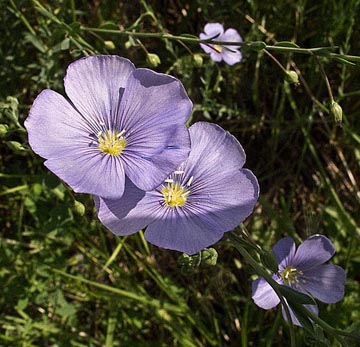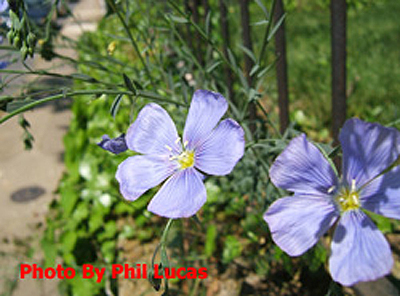
Its cultivation reaches back to the remotest periods of history, Flax seeds as well as the woven cloth having been found in Egyptian tombs. It has been cultivated in all temperate and tropical regions for so many centuries that its geographical origin cannot be identified, for it readily escapes from cultivation and is found in a semi-wild condition in all the countries where it is grown.
Many traditions are associated with this useful plant. Flax flowers were believed in the Middle Ages to be a protection against sorcery. The Bohemians have a belief that if seven-year-old children dance among Flax, they will become beautiful, and the whole plant was supposed to be under the protection of the goddess Hulda, who, in Teuton mythology, was held to have first taught mortals the art of growing Flax, of spinning, and of weaving it.
Flax seed has a long history of medicinal use, its main effects being as a laxative and expectorant that soothes irritated tissues, controls coughing and relieves pain. The seed, or the oil from the seed are normally used.
The roasted seed is said to be a coffee substitute. A herbal tea can be brewed from the seed. An edible oil is obtained from the seed, though it needs to be properly refined before it can be eaten. Some caution is advised in the use of the seeds for food since some varieties of this plant contain toxins.

The seed is analgesic, demulcent, emollient, laxative, pectoral and resolvent. The crushed seed makes a very useful poultice in the treatment of ulceration, abcesses and deep-seated inflammations. An infusion of the seed contains a good deal of mucilage and is a valuable domestic remedy for coughs, colds and inflammation of the urinary organs. If the seed is bruised and then eaten straight away, it will swell considerably in the digestive tract and stimulate peristalsis and so is used in the treatment of chronic constipation.
Flaxseed is by far the richest source of alpha-linolenic acid (ALA), the parent compound of the omega-3 fatty acids. In comparison, fish contain only trace amounts of ALA and fish oil can adversely affect the taste and odor of food products.
Omega-3 is an essential fatty acid because it cannot be synthesized by the body. Research indicates that ALA improves immunity, the body's ability to defend itself against foreign substances. Studies have also shown that alpha-linolenic acid may lower the risk of stroke and other cardiovascular diseases. Both the Food and Agriculture Organization and the World Health Organization recommend an increased daily intake of omega-3 fatty acids.
A fiber is obtained from the stem. It is of very high quaiity and is used in making cloth, sails, nets, paper, insulating material etc. The plant is harvested just after it flowers. The yield is 0.5 to 0.9 tonnes of fiber per hectare.
 Common Flax
Common Flax